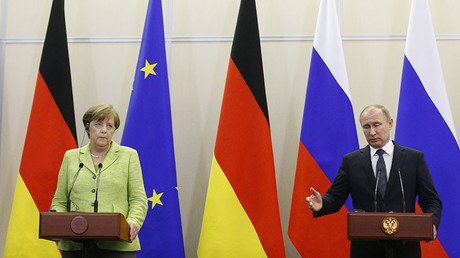German spy chief: Decision on whether to use ‘hacked data’ in Bundestag elex will be made in Kremlin

It’s up to the Kremlin to decide whether to use any disinformation tools or data obtained by alleged Russia-linked hackers in the 2015 Bundestag cyberattack to compromise the upcoming general election in Germany, the country’s spy chief said.
“All in all, I can say that our counterparts are trying to generate information that may be used for disinformation or influence campaigns. It’s a political question whether they will try to do so,” Hans-Georg Maassen, chief of Germany's Office for Protection of the Constitution (BfV), said at a conference on cybersecurity in Potsdam on Thursday.
Maassen added that similar cyberattacks took place during the US elections where “things have gone well.”
Washington has been stirring up accusations against Moscow that it meddled in the 2016 presidential election from the campaign’s earliest stages.
Kremlin, in its turn, has repeatedly denied these kind of allegations, stressing that no solid evidence backing up the claims was presented to the public.
“I can’t predict whether Germany will have to go through the same thing [as in the US] this year, this is also a political decision and I assume that this decision will be made by the Kremlin,” Maassen said.
The official also spoke of the 2015 cyberattack on the country’s parliament (Bundestag) when “large amounts of data” were seized. The attack was blamed on Sofacy/ATP 28, a group of hackers whom, he said, are directly linked to Russia’s intelligence service.
This is not the first time Maassen has said that Russia is behind the 2015 attack. He voiced the same accusations in May 2016, but also on that occasion he failed to provide any proof.
According to the BfV chief, his agency notes that since the last Bundestag elections in 2013, there has been “an increasingly aggressive cyberespionage” against Germany, though not mentioning Russia here in particular.
In February, German intelligence agencies looking for evidence of alleged Russian interference in the country’s domestic affairs said they found no reliable evidence of a “disinformation campaign,” Sueddeutsche Zeitung reported at the time.
Berlin has also never pressed any official accusation against Moscow to date.
Germany’s Chancellor Angela Merkel, for her part, said she was not worried about the possibility of a hacking campaign aimed at interfering with the upcoming elections in the country.
“We know cyber criminality is an international challenge... but we expect that the German election will go ahead unharmed and that we have enough different positions to tackle a range of topics,” Merkel said at a joint press conference with Russia’s President Vladimir Putin in Sochi on Tuesday.














